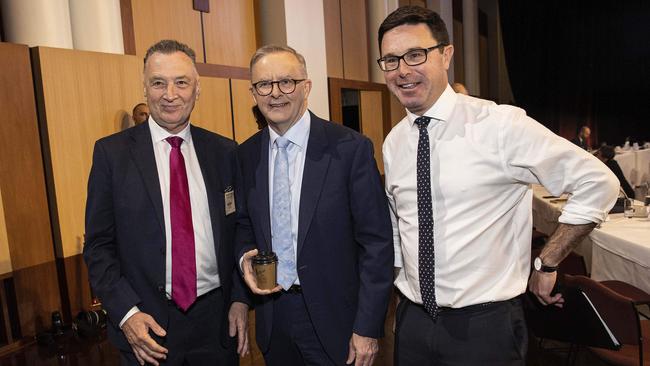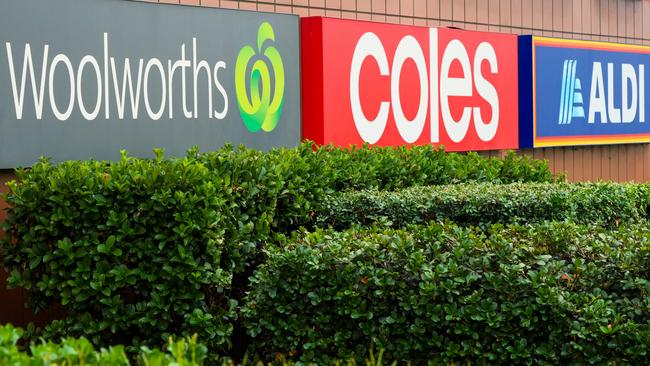Big fines for supermarkets but no break-up under mandatory code
Woolworths, Coles, ALDI and Metcash face massive fines – including up to 10 per cent of their turnover – under a new mandatory code of conduct urged by Craig Emerson.

Supermarket giants Woolworths, Coles, ALDI and Metcash face massive fines – including up to 10 per cent of turnover – under a new mandatory food and grocery code of conduct recommended by former Labor minister Craig Emerson.
Dr Emerson’s interim food and grocery code of conduct review report released on Monday recommends stronger regulation and punishment for supermarket chains to address market power concerns rather than new divestiture powers pushed by the Coalition and Greens.
The interim report, which includes eight final recommendations and three draft recommendations, says the code must be mandatory and supports empowering the Australian Competition & Consumer Commission to impose strict penalties for breaches and facilitating arbitration to resolve disputes.
Dr Emerson’s mandatory code, which includes provisions protecting suppliers against retribution, includes harsh penalties for rule breaches. The former trade, small business and competition policy minister said this would bring the ACCC “into code enforcement”.

“It would be able to seek penalties for major or systemic breaches of up to $10m, 10 per cent of a supermarket’s annual turnover, or three times the benefit it gained from the breach, whichever is the greatest,” he said.
Dr Emerson, who will finalise his report by June 30, said “a heavy imbalance in market power between suppliers and supermarkets in Australia’s heavily concentrated supermarket industry necessitates an enforceable code of conduct”.
“An effective code of conduct would benefit smaller suppliers and consumers by enabling suppliers to innovate and invest in modern equipment to provide better products at lower cost,” Dr Emerson said. “The existing food and grocery code of conduct is not effective. It contains no penalties for breaches and supermarkets can opt out of important provisions by overriding them in their grocery supply agreements.
“I firmly recommend the code be mandatory and apply to all supermarkets with annual revenues exceeding $5bn, which at present are Coles, Woolworths and ALDI, and wholesaler Metcash.”

The Coalition and Greens have floated competing divestiture policies for supermarkets, with Nationals leader David Littleproud leading the charge to impose a “big stick” approach.
The interim report said the review “does not support a forced divestiture power to address market power issues in the supermarket industry”.
“If forced divestiture resulted in a supermarket selling some of its stores to another large incumbent supermarket chain, the result could easily be greater market concentration,” the review said.
“If large incumbent supermarket chains were prohibited from buying the divested stores, that would leave only smaller supermarket chains and foreign supermarkets as potential buyers.
“Further, if these smaller chains were not interested, or were not in a position to buy, these stores would be forced to close. This would be at the cost of the jobs of the workers in those stores and of inconvenience to local shoppers who would need to go elsewhere to buy their groceries.”

The report said a mandatory code and tougher penalties “constitute a far more credible deterrent to anti-competitive behaviour than forced divestiture laws”.
Jim Chalmers and Assistant Competition Minister Andrew Leigh said the interim report found that smaller suppliers’ fear of retribution was a “major obstacle to the use of the code”.
The review, which will open to consultation until April 26, recommends stronger protections for complaints, including new channels for making informal complaints and access to independent dispute resolution.
The Treasurer and Dr Leigh said they supported a “fair go for families and a fair go for farmers … the interim report notes there is a heavy imbalance in market power between the smaller suppliers and supermarkets, which warrants a strong and effective code.”
Amid strong support for divestiture powers in the Nationals, the Coalition is devising a policy that includes more guardrails than laws pushed by the Greens.
Mr Littleproud, who is working with opposition Treasury spokesman Angus Taylor, last week said “while the Nationals support, in principle, broader divestiture powers, what we need to understand is that there are nuances to the supermarkets and their market dominance that need to be looked at and some of the existing architecture that’s already there”.
Peter Dutton last week said he was open to stronger action if “there’s market failure in a particular market”.








To join the conversation, please log in. Don't have an account? Register
Join the conversation, you are commenting as Logout